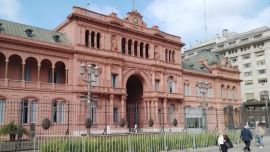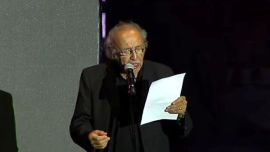The International Monetary Fund (IMF) and Argentina have formally begun negotiations over a new loan agreement as the current programme draws to a close, a spokesperson for the international financial institution confirmed Thursday.
“The authorities have formally expressed interest in moving to a new programme, and negotiations are now underway,” IMF Communications Director Julie Kozack said during a press briefing at the Fund’s headquarters in Washington.
The IMF’s current 30-month loan agreement with Argentina expires on December 31, and is worth around US$44 billion, making it the largest programme in the Fund’s long history.
The Extended Fund Facilities programme – which was signed in March 2022 by the previous government under former president Alberto Fernández, who renegotiated a US$57-billion credit-line agreed by his predecessor Mauricio Macri four years earlier – has been adhered to by current President Javier Milei’s government.
However, Kozack announced Thursday that Argentina would work towards a new deal rather than finishing the remaining quarterly reviews.
Asked about the two pending reviews, Kozack explained that “it is not unusual for the authorities to let an existing arrangement expire without completing all the reviews while they are considering moving to a new IMF-supported programme.”
Talks between Argentina and the IMF gained momentum after a team of officials from Economy Minister Luis Caputo’s portfolio and the Central Bank travelled to Washington earlier this month to meet with the Fund’s representatives.
A central question in negotiations on Argentina’s next IMF programme is whether the lender will provide Milei with additional financing beyond rolling over the US$44-billion burden — and how much. Milei floated US$15 billion as a potential figure earlier this year but hasn’t referenced the figure recently. Caputo said this week that he anticipates fresh funds to be part of the programme.
‘Impressive results’
Since Milei took office last December, his government has launched a sweeping austerity programme aimed at slashing the public deficit and bringing down inflation, which had reached record levels.
On Thursday, Kozack praised the “impressive results” achieved by Milei’s administration, including a “sizeable reduction in inflation, fiscal surpluses and improved international reserve coverage.”
She also noted that the “recovery of [economic] activity and real wages” is “firmly” underway, highlighting government data published this week that showed the economy exited recession in the third quarter, returning to growth.
Gross Domestic Product (GDP) grew 3.9 percent in the third quarter of 2024 compared to the previous quarter, although it fell 2.1 percent year-on-year, according to data from the INDEC national statistics bureau.
This is the first quarterly growth registered after three consecutive periods of decline, and the first quarterly increase in GDP since Milei took office.
Although the IMF expects Argentina to end the year with inflation at an annual rate of 229 percent, it has eased sharply over the course of the year, falling to a monthly rate of 2.7 percent in October, according to the authorities.
But this macro success has come at a steep cost: authorities devalued the Argentine peso by 52 percent last December, while more than 260,000 jobs in the private and public sectors were lost in just the first few months of Milei’s term.
More than half the population now lives below the poverty line, according to official statistics, marking a sharp increase that Milei’s administration disputes.
The IMF estimates that Argentina’s economy will contract by 3.9 percent this year, before bouncing back to grow by five percent in 2025.
“Our team continues to work constructively with the Argentine authorities to build on the progress made thus far and address remaining challenges,” Kozack said.
Negotiations
If agreed, a new deal would mark the country’s 23rd programme with the organisation since 1958 and its third since just 2018.
The IMF has a poor track record in Argentina after several agreements over the decades failed to turn around the economy as one government after another often flouted programme targets while spending the global lender’s money.
Milei and Caputo, his top negotiator, have a mixed relationship with the IMF. The President lambasted one of the Fund’s top officials earlier this year, Rodrigo Valdés, who ultimately chose to step away from negotiations.
During the first deal in 2018, Caputo disagreed with IMF officials over currency policy and resigned after a short tenure as Central Bank chief following a stretch as Argentina’s finance minister at the time
In an interview with The Wall Street Journal published Wednesday, Milei said that he is banking on the support of US president-elect Donald Trump in his quest for new IMF financing. “I think it’s very likely [we secure a new deal], because the United States has discovered that we are a reliable partner,” Milei said.
Back in November, Caputo confirmed in an interview with the local TN television news channel that the country was informally discussing a new agreement with the IMF that would “involve new money.”
– TIMES/BLOOMBERG/AFP


























Comments